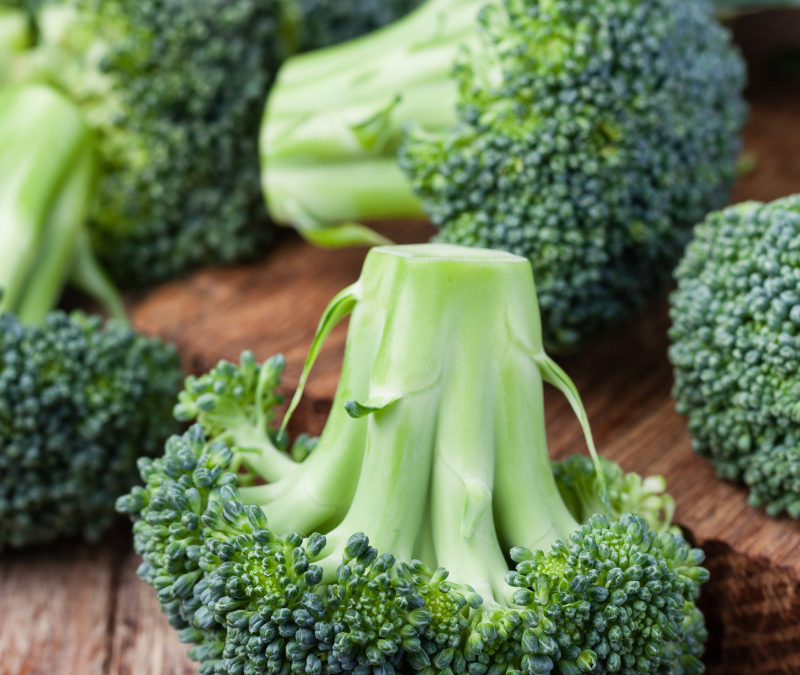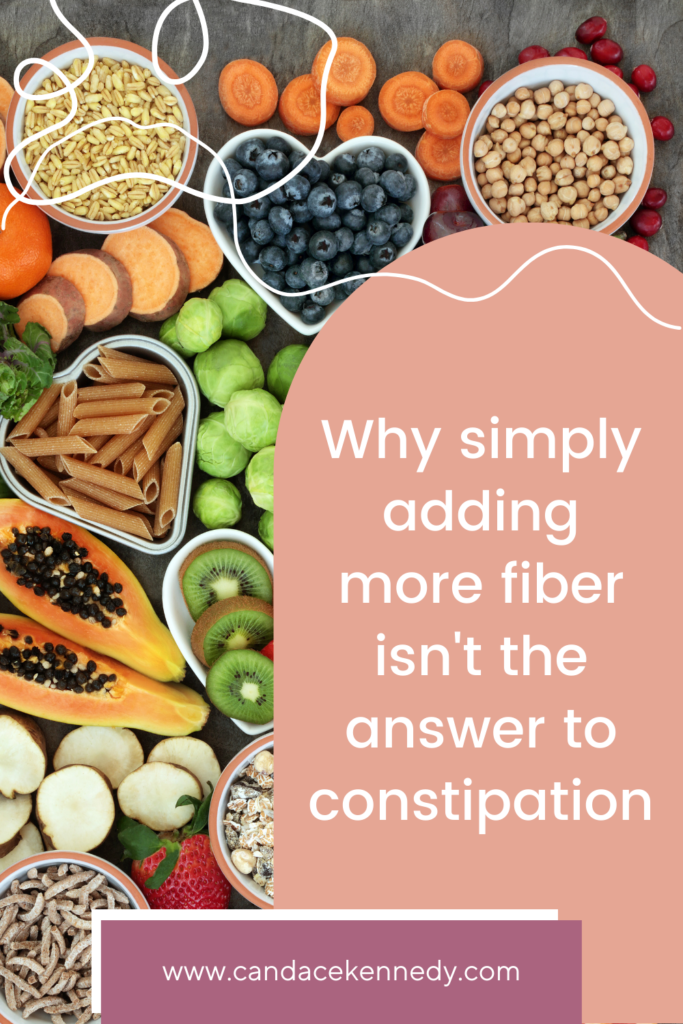It never ceases to amaze me how many women I come across that struggle with constipation. It is one of the most common complaints I hear about! And what is the typical default recommendation for constipation? Eat more fiber! However, if you’re already backed up, adding more fiber to your diet can make constipation go from bad to worse.
If you are not having a complete, easy BM 1 to 3 times a day, you’re constipated. Many women who come to me with gut struggles only have a BM once every few days! One of my recent clients would even go up to 10 days without a BM before working with me! She had been dealing with these chronic issues for years and her doctors would just give her more laxatives and tell her to eat more fiber.
Here’s the problem. A laxative is a bandaid. It’s not addressing WHY constipation is happening in the first place. Constipation is a metabolism and mineral balance issue. If you’re not addressing those, you’re not getting to the root cause.
In this post, we will talk about:
- Why fiber can do more harm than good when it comes to constipation
- How bowel function is dependent on a healthy metabolism
- How to support your metabolism to support gut function and motility
- Other ways to support overall gut health.
“Eat more fiber” fails to factor in metabolism or the unique balance of microbes our guts possess
The advice to “eat more fiber” doesn’t consider the unique balance of microbes, both good and bad, that each of us have in our digestive tracts. Nor does it factor in metabolism.
I am certainly not against fiber, but many people with gut issues have a difficult time with fiber.
In the study, “Stopping or reducing dietary fiber intake reduces constipation and its associated symptoms,” researchers found that those suffering from constipation had symptoms dramatically improve once they REDUCED/REMOVED dietary fiber.
Another study showed that despite the widespread use of fiber supplementation, it is effective in only a small population, and evidence supporting increasing fiber is limited.
Fiber has a role to play in gut health, but telling someone with constipation to “eat more fiber” is like trying to wash cardboard down the drain in an already clogged-up sink.
Why fiber isn’t the answer to constipation:
We often think of constipation as just the inability to have a bowel movement, with the false notion that adding more bulk (via fiber) will make it easier to go. This is, however, reductionist thinking that can do more harm than good. Here’s why:
Often, when someone is constipated, the colon is already packed with feces, and adding more bulk to that scenario isn’t going to make things easier. It will, however, make a person way more bloated and uncomfortable.
On top of all that, if you’re dealing with something like SIBO (and many IBS/constipation sufferers are), fibers from FODMAPS can make your symptoms way worse!
Not all fiber will cause issues for all people. Many people can easily digest well-cooked root vegetables and squashes, for example.
Constipation is a symptom of a suboptimal metabolism
A weak metabolism drives constipation by:
- Slowing gut motility
- Suppressing stomach acid production
- Creating an environment where pathogens thrive
- Provides inadequate energy to the digestive tract
- Weakens contractions in the digestive tract
- Reducing bile flow
Let’s take a closer look at each of these below.
1. A weak metabolism slows gut motility.
The metabolism is driven by thyroid function and cellular energy production.
An under-active thyroid can slow many bodily functions, including gut motility, resulting in constipation.
Weak metabolism = underactive thyroid = slow digestion.
2. Adequate stomach acid production requires a strong metabolism.
A sluggish thyroid leads to low stomach acid production.
A lack of adequate stomach acid impairs digestion and nutrient absorption, leading to a slower transit time, constipation, bloating, and an increased liver burden.
3. Low stomach acid allows opportunistic pathogens to thrive.
Adequate stomach acid is one of our first lines of defense against pathogens. Low stomach acid creates an environment where pathogens like H.Pylori, Candida, and SIBO can thrive, leading to overgrowths.
Constipation is often a symptom of these overgrowths as gut dysbiosis impairs gut function and motility.
4. Bowel function depends on a healthy metabolism.
Your metabolism turns the food you eat into energy. The cells of your digestive system need adequate ENERGY.
5. A weak metabolism weakens GI contractions.
The muscles lining the digestive tract contract to move digested food through the small and large intestine. A weak thyroid weakens these contractions.
6. Slow metabolism leads to low bile flow.
A slow thyroid. may result in delayed emptying of the biliary tract, (sluggish bile flow).
Bile is antimicrobial and helps to keep the terrain of the small intestine clean. It is your body’s natural defense to prevent pathogenic overgrowths, like SIBO. Without adequate bile, SIBO can develop and contribute to constipation.
Chronic constipation is common, but not normal.
Constipation is a symptom that shouldn’t be ignored by simply downing laxatives as a bandaid approach.
Along with constipation being flat-out uncomfortable, chronic constipation increases gut inflammation, drives hormone imbalances, makes you more prone to infections, and results in nutrient malabsorption of in the gastrointestinal tract. Big problems!
Support the metabolism to support a healthy gut.
Constipation is a metabolic issue. More fiber and water aren’t going to change that.
I often see big improvements in my clients’ symptoms when they:
- Reduce certain types of fiber
- Prioritize mineral-rich foods
- Prioritize copper-rich foods and magnesium
- Eat a daily raw carrot salad
- Keep blood sugar balanced
- Eat collagen/gelatin-rich foods and broths
- Find the right probiotic for you
- Work together to clear any bacterial/yeast overgrowths in the GI tract
- Get fiber from easy-to-digest, cooked squashes and root vegetables.
- Hydrate with minerals from broths, coconut water, fruits, adrenal cocktail.
Need help with gut issues? Schedule a FREE 15-minute consultation with me.
Resources
Stopping or reducing dietary fiber intake reduces constipation and its associated symptoms
Review of the treatment options for chronic constipation
Small Intestinal Bacterial Overgrowth: A Comprehensive Review
Small intestinal bacterial overgrowth syndrome
Inhibition of methanogenesis by human bile
Important Notes:
I am not a doctor, and I don’t claim to be one. I can’t prevent, treat, cure or diagnose illness or disease. The information presented on this website is not meant to replace a one-on-one relationship with a qualified health care professional and is not intended as medical advice, treatment or diagnosis. The purpose of this website is to share knowledge from my research and experience. I encourage you to make your own decisions regarding your health care based on your own research and relationship with your health care professional.
Some of the links on this page are affiliate links, which means I earn a small commission if you purchase through that link, at no additional cost to you. Thank you for supporting my work!



